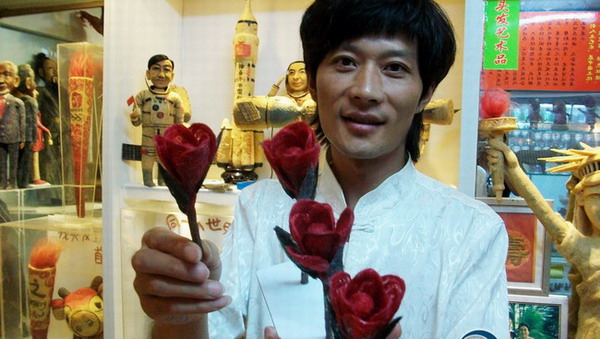Caring traits outweigh financial muscle
By Xiao Lixin (chinadaily.com.cn) Updated: 2015-02-12 14:05
|
 |
|
The art of roses, which are made from hairs, are displayed on Aug 13, 2014. [Photo/Xinhua and CFP] |
To have, or not to have a nuan nan as a boyfriend, is the question. Nuan nan refers to men who are nice and considerate, and will always be there for you. Such traits have made them a favorite of Chinese women this Valentine's Day.
The popularity of the term nuan nan even made it one of the buzzwords of 2014, according the survey of the Chinese National Language Monitoring and Research Center and the Commercial Press.
Since an increasing number of Chinese women are becoming financially independent, their main concern is no longer whether a man can support the family. Rather many women look for rational, understanding and emotionally balanced partners, who according to psychology consultant Lu Yue seem to be in "short supply" because generally Chinese men seem unwilling to share their feelings with women, be they their girlfriends or wives.
There is no reason why a man has to play the dominant role in a relationship in today's society. There is also no reason why a man has to be strong, handsome and economically sound enough and his woman has to be beautiful, and adept at cooking and housework to marry each other. Gender roles have changed; in fact, they are changing by the day.
Another term that has become popular, in a negative sense, among netizens, especially young women, is zhi nan ai. It literally means "straight man cancer" in English and ridicules heterosexual men who are annoying to the level of being offensive. The term "originated" on douban.com, a popular Chinese networking site, in late June, and refers to male chauvinists who live in their own world and are rarely satisfied with their female partners. They are the complete opposite of nuan nan.
Both terms were invented by women (perhaps with some help from men), reflecting the rising power of women, who instead of allowing men to make fun of them have started targeting men with their satiric gifts.

I’ve lived in China for quite a considerable time including my graduate school years, travelled and worked in a few cities and still choose my destination taking into consideration the density of smog or PM2.5 particulate matter in the region.











